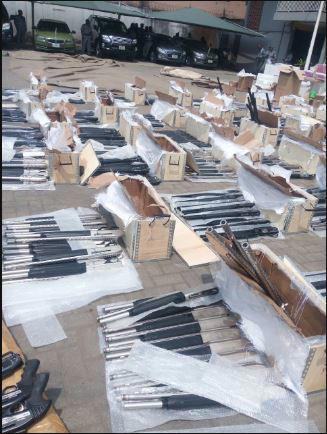
An arrested terrorist in Sokoto, 33-year-old Musa Mohammed Kamarawa made a shocking revelation last week when he disclosed how he bought a gun truck worth N28.5 million for one of the terrorist leaders in Sokoto state.
Kamarawa, a childhood friend of the notorious bandit kingpin, Bello Turji, who was one of the 37 arrested bandits confessed during interrogation how he had brought sophisticated weapons into Nigeria on many occasions.
The question that bothers Nigerians therefore is how terrorists are able to sneak in arms into the country without being detected by the customs and immigration officials.
Over 1,000 illegal routes into Nigeria
Information at Saturday Vanguard’s disposal revealed that most of these bandits sneak into the country between 12 midnight and 3 am, when it is certain that Immigration and Customs officers manning the land and sea borders are relaxing at their respective posts at the 84 regular and officially recognized routes into Nigeria.
This disclosure was made by a senior Immigration officer, during an interaction with Saturday Vanguard, following last weekend’s revelation by one of the 37 suspected bandits arrested in Sokoto.
A senior Immigration officer who spoke on the condition of anonymity, told Vanguard that “We have over 1,000 illegal and irregular routes into Nigeria, both on land and through the sea. These criminals come in through these routes, perpetrate heinous crimes including terrorism and go back to their countries”
According to him, “a good percentage of insurgents and bandits who have been declared as terrorists that are in Nigeria today, came in through these illegal and irregular routes. These routes are mostly found in the northern parts of the country. Also, Lagos and Ogun states are some of the major riverine routes that these strangers come into Nigeria, through the West African flank.
“Most times, they bring weapons into the country with the aid of their cows, through the forests in the northern part of the country, pretending to be cattle rearers. They usually move between 12 midnight and 3am. By then Immigration officers at designated points would have moved to their regular terrain . At other times, the bandits are clad in military camouflage, disguising as soldiers. Most arms are sneaked into Nigeria from Libya, Niger and Chad Sometimes
“The Minister of Interior can not pretend to be ignorant of these irregular and illegal routes into the country. Sometime ago, a former Minister of Interior promised that the construction of a border patrol plaza that would strengthen effective surveillance around borders in the country would be constructed . But here we are, still expecting that to happen.
“The weapons in the hands of these enemies of Nigeria are capable of withstanding those of the military, if nothing is done immediately. The only advantage the military has over them is the aerial arsenal. But with what happened the other time when these terrorists fired at one of the military aircraft and brought it down, you will know that their agenda is not something to be treated with kids glove. The Federal Government must rise to the challenge and put an end to the activities of these bandits”, he said.
Bandits have grown in audacity
Indeed, bandits have grown in audacity in the tempo of attacks and have transitioned to a top security threat in Nigeria. In some instances, they impose levies on communities, send letters of warning and impending bloodletting to their helpless targets in the northern region of the country. The scenario in many flash-points is anguish, brutish life, forced evictions from ancestral homes, deprivation of sources of livelihood and a seemingly unending humanitarian crisis.
READ ALSO: EFCC nabs fake Army General over N270 million fraud with 6 guns
In 2021, about 2,334 people died in 935 events recorded in Nigeria, according to the Conflict tracker database, with communities in the northwest and north central Nigeria witnessing the worst of the menace. Some of these deaths were caused by bandits.
Although the military, the police and other security agents have unrelentingly waged war against them, yet there is no clear end of the menace, rather, new insurgency groups are emerging, posing new threats and continuing old terrors.
Killings
One of their victims was a former governorship aspirant in the 2019 election in Zamfara State, Sagir Hamidu, on the Abuja-Kaduna expressway, in November, 2021. In one of the latest attacks, on Wednesday in Katsina State, a Divisional Police Officer in Magama, Jibia Local Government Area, DSP Abdulkadir Rano, a soldier and one other street urchin, Almajiri who recently arrived in the community were killed. This occurred barely 24 hours after a similar attack occurred in the Bakori-Funtua area of the state. More alarming, is the sophistication of arms used by bandits to unleash mayhem on their victims and security agents who stand in their way
Investigation by Saturday Vanguard revealed that there are different groups of bandits scattered around the length and breadth of the northern part of the country. Leaders of each of the groups go as far as liaising with gun runners in the African flank to bring these weapons into the county.
CISLAC blames Immigration, Customs
Meanwhile, at a focus group discussion on the “Barriers and Bridges to Accountability in the Defence and Security Sector”, organized by the Civil Society Legislative Action Centre, CISLAC in Lagos, its Programme Officer Mr Salaudeen Hashimu, argued that bandits were able to bring gun truck into the country because our borders are porous.
According to Hashmimu, “The Nigeria Immigration Service and the Nigeria Customs Service are part of the problem because these aliens are not properly controlled and the inability to control them has continued to threaten the security architecture of the system. Our borders are becoming very porous, we have a belt of over 2000 kilometres that is not properly policed. Also, there seems to be a lot of commercialization going on by personnel at the nation’s borders. They look the other way and allow aliens to move in and out of the country at will.
And of course, for the Customs, I think it is important that they begin to tighten up more, there seems to be some effort coming from the system, as we have seen where customs have been able to expose arms and containers full of ammunition, but of course, there are still some sneakers where these things are going on.
“There are over 70% of the eight million small arms in the country, in the hands of armed opposition groups. How are these things happening? We know that even the collapse of Libya has continued to lead to the export of personnel and fighters into the country. All of these things put together suggest that we need to tighten up more around our border patrols.
“The Sahel and the Gulf of Guinea are some of the biggest threats to security in this part of the country. And until we regulate and work more, and those who have responsibility to act should do a lot more, we might continue to experience this situation and there might not be any end in sight till there is a deliberate approach towards stemming the current tide that we are currently experiencing”, Hashimu stated.
NIS meets over porous border
Apparently bothered by the dangers posed by porous borders, Nigeria Immigration Service Comptrollers from eight different locations in the North/West met in Katsina last month to strategize on how to tackle the development.
Amidst the proliferation of weapons through porous borders, Mr Adeshina Oke of CISLAC stated that “connivance of some residents who serve as informants to bandits undermines security operations. Therefore, the Nigerian government should deploy measures to bring communities closer to the government, especially security agencies. In addition, awareness campaigns to gather support for the Nigerian forces combating bandits would help improve civil-military relations. From news reports, vested interests and other sentimental issues appear to be triggering violence in the region. Military efforts may seem like the best solution to the issue of banditry, but paying close attention to the socio-economic and socio-cultural dimensions of the conflict is equally important in building peace and stability in the area”.











